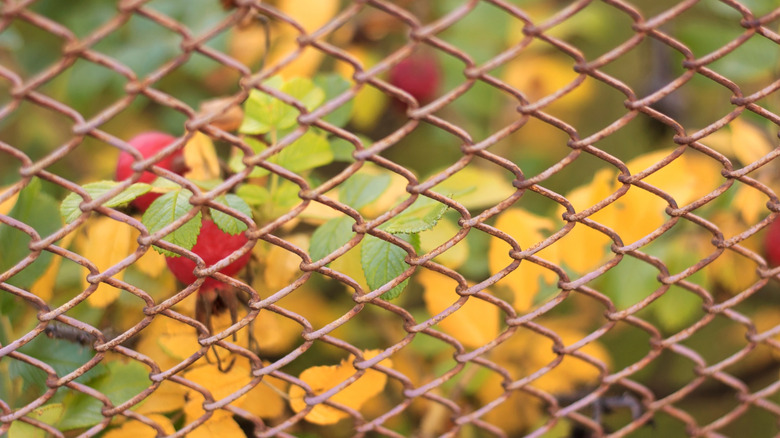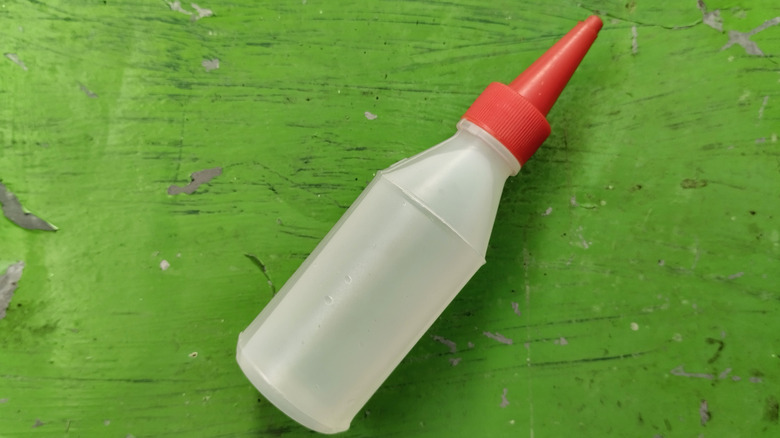Clean And Remove Rust From A Metal Fence With A Natural Solution
We may receive a commission on purchases made from links.
A metal fence is a fantastically durable and affordable fencing idea to enclose your yard. But, as is the nature of metal, when exposed to the elements — particularly moisture — the fence will rust over time. Even treated metals, like steel, will eventually see that familiar, splotchy red crust form on its surface. If left unattended, rusty fences can cause big issues. Rust can eventually compromise the integrity of the fence, causing security issues since brittle metal pieces can actually break and create holes. On top of that, rusty metal fences are just a plain eyesore in front of the house. Not all hope is lost, though! There is an easy, all-natural solution for removing and neutralizing rust from your metal fence, and the answer is probably in your kitchen cabinet.
A DIY combination of white vinegar, lemon juice, and/or salt can do the trick in zapping away those unseemly red spots. Using vinegar is a brilliant hack to remove rust from all sorts of metal surfaces, and you can apply it straight to your fence outside for a big cleaning effect. Leveraging the acidity of the vinegar and either the lemon juice or salt, you can have your fence gleaming in no time.
How to use vinegar to remove fence rust
First, begin by prepping your metal fence with a wire brush, sandpaper, or even steel wool to buff out the rust and create a smooth surface down to the naked metal. After you've removed any major rust splotches, mix up your white vinegar solution. Either using 50% vinegar and 50% lemon juice or combining a gallon of white vinegar with a cup of salt, prepare the solution so that you have an ample amount to fully coat the fence and neutralize any and all remaining rust left behind from the initial buffing. Vinegar is an acetic acid agent that is complemented by the abrasiveness of salt to clean stubborn stains. Lemon juice, meanwhile, contains citric acid which is also extremely effective to cut through stubborn material.
Coat the fence in the solution of your choice so that any leftover rust that you didn't remove during the first surface clean will be dealt with. Let the solution soak the fence for an hour and then rinse the metal with some soapy water. From here, you can take your cleaning a step further by painting your fence with a protective rust-resistant primer paint to slow down any future rust episodes. Of course, this is all best done during a dry day so that you don't have to deal with moisture or humidity.
How to help prevent rust on your fence
While this natural vinegar solution is definitely handy for rust removal, you can help ensure the longevity of your fence by implementing some rust prevention measures as well. For instance, when you use the rust-resistant primer paint, be sure that each coat dries properly before applying another coat on top so that you're not locking moisture in. To add an extra layer of protection, consider using a zinc galvanized spray paint like Rustoleum galvanizing compound ($9.98 on Amazon) on the fence as another defensive barrier against the weather. Also, if replacing your current metal fence with a new one is in the budget, consider opting for a more rust-resistant material like treated steel or aluminum; these options stand a better chance at staying rust-free.
Of course, routine maintenance is also key. Keep an eye out for any early signs of rusting on your fence (rust can spread if not dealt with efficiently) and commit to regular cleanings so that the rust doesn't have an opportunity to completely take over. Though it may seem like a pain, a bit of routine TLC will make sure your fence instantly boosts your home's curb appeal and will help it last — securely — for many years to come.


